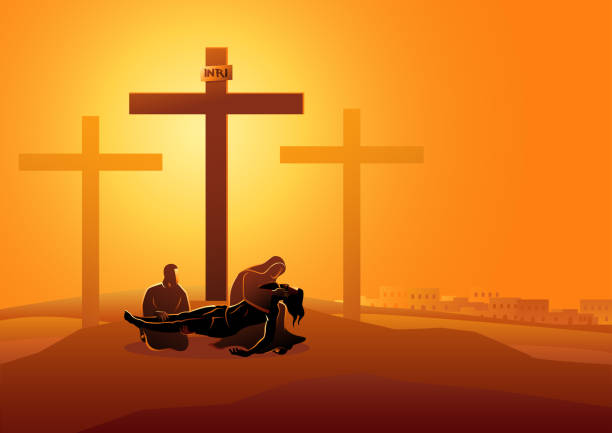The Passion of Christ: What Really Happened?
Galatians 6:14 – “But God forbid that I should glory, save in the cross of our Lord Jesus Christ, by whom the world is crucified unto me, and I unto the world.”
The word “passion” in reference to Jesus Christ, as used in Acts 1:3, refers to the intense and final period of suffering that He endured before His death. Jesus Christ, the Son of God and Son of Man, endured the full force of human suffering by taking upon Himself the sin of the world. He was tempted in all points like we are, yet without sin, and His sufferings on the cross were not only physical but spiritual and emotional as well.
Crucifixion, as designed by the Roman government, was intended to be the most shameful, excruciating, and public form of execution. It maximized pain and humiliation while slowly bringing death. Jesus endured this willingly. Hebrews 12:2 says that He endured the cross and despised the shame for the joy that was set before Him.
Jesus shed His blood on the cross. The blood of Jesus is significant both in symbolism and in substance. According to Leviticus 17:11, the life of the flesh is in the blood, and when Jesus shed His blood, He gave His very life as a sacrifice for sin. His blood is precious because He was sinless (1 Peter 1:19), cleansing because it washes all sin away (1 John 1:7, Revelation 1:5), and divine because it is the blood of God (Acts 20:28).
The Anticipation of Christ's Suffering
Jesus knew from the beginning what awaited Him. He repeatedly told His disciples that He would be delivered into the hands of sinners, crucified, and rise again on the third day (Matthew 16:21, Luke 24:7). His divine foreknowledge brought about tremendous anguish, especially the night before His crucifixion in the Garden of Gethsemane.
In Luke 22:44, Jesus is described as being in "agony." This is the only time that word is used in the Bible. His sweat became like great drops of blood, a medical condition known as hematidrosis, which occurs under extreme stress. He prayed fervently, asking if the cup could pass from Him, but concluded, “Nevertheless not my will, but thine, be done” (Luke 22:42). His soul was "exceeding sorrowful, even unto death" (Matthew 26:38). In His moment of anguish, His disciples slept. Three times He found them sleeping, and once He was betrayed, they all fled (Mark 14:50). Judas betrayed Him with a kiss, and Peter denied Him three times.
The Examination of Christ
Jesus was arrested at night and brought before Annas, Caiaphas, and the Sanhedrin. These were not lawful trials. False witnesses were brought against Him, but their testimonies did not agree. Finally, He was condemned for blasphemy because He affirmed He was the Son of God. They spit in His face, struck Him, mocked Him, and blindfolded Him to humiliate Him even more (Matthew 26:67-68).
Because the Jews did not have the authority to execute, they brought Him to the Roman governor, Pontius Pilate. Pilate could find no fault in Him (John 19:6) and sent Him to Herod, who also found no fault and sent Him back. Pilate attempted to release Jesus, offering the crowd a choice between Jesus and Barabbas, a known criminal. The crowd chose Barabbas.
Though Pilate symbolically washed his hands, he could not absolve himself of guilt. Jesus was scourged with a Roman flagellum, a whip embedded with pieces of bone and metal. The whip tore open His skin and caused deep lacerations. After this brutal beating, Roman soldiers mocked Him again, placing a crown of thorns on His head, a robe on His torn back, and a reed in His hand as a mock scepter. They struck Him on the head with the reed and spat upon Him. The crown of thorns represents the curse of sin from Genesis 3:18, which Jesus bore upon His head.
The Crucifixion of Christ
Jesus carried His own cross toward Calvary until His strength failed, and Simon of Cyrene was compelled to carry it the rest of the way. At Golgotha, Jesus was nailed to the cross, likely through the wrists and feet. The pain of crucifixion was not just in the nails, but in the slow asphyxiation and agony of shifting weight between nailed limbs to breathe. A medical description of crucifixion explains that breathing in such a position is extremely difficult and painful.
While Jesus hung on the cross, He was mocked by bystanders, religious leaders, soldiers, and even the thieves crucified beside Him. Only one thief later believed and was promised paradise that day. Jesus was crucified at the third hour (9:00 AM) and died at the ninth hour (3:00 PM), after three hours of darkness that covered the land.
The title posted above His head read in Hebrew, Greek, and Latin: “This is Jesus of Nazareth, the King of the Jews.” Though written by Pilate, this declaration stands forever as the truth. Jesus is indeed King of Kings. His cross bore the weight of sin, and His suffering was the fulfillment of hundreds of Old Testament prophecies, including Psalm 22 and Isaiah 53.
The Seven Sayings from the Cross
-
“Father, forgive them; for they know not what they do” (Luke 23:34)
-
“Today shalt thou be with me in paradise” (Luke 23:43)
-
“Woman, behold thy son! Behold thy mother!” (John 19:26-27)
-
“My God, my God, why hast thou forsaken me?” (Matthew 27:46)
-
“I thirst” (John 19:28)
-
“It is finished” (John 19:30)
-
“Father, into thy hands I commend my spirit” (Luke 23:46)
Each statement reveals the heart of Jesus in His suffering—His mercy, His obedience, His fulfillment of Scripture, and His victory.
Who Crucified Jesus?
The Jews delivered Jesus to Pilate. The Romans physically crucified Him. Satan was spiritually behind it. Yet it was the will of God that He suffer (Isaiah 53:10). Most importantly, it was our sins that nailed Him to the cross. Jesus died for our sins, was buried, and rose again. To reject that payment is to trample His sacrifice. Those who teach salvation by works are, in effect, crucifying the Son of God afresh (Hebrews 6:6).
Jesus died once for all. He paid the full price for sin. His suffering was real, it was prophesied, and it was victorious. May we never boast in anything but the cross of our Lord Jesus Christ.





No comments yet. Be the first to share your thoughts!